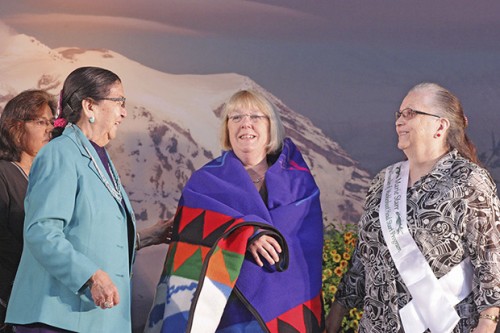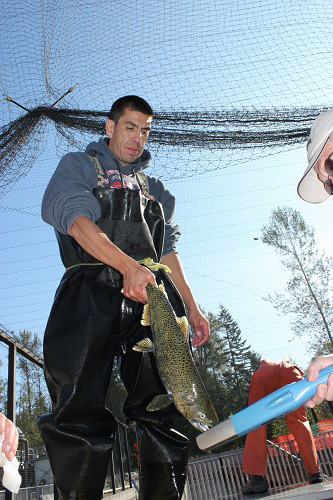
By Mark Klaas, Auburn Reporter
Wrapped in a warm blanket, a gift from the Muckleshoot Tribal Council, U.S. Sen. Patty Murray (D-WA) felt right at home Tuesday.
Murray was a special guest, joining tribal leaders, teachers, parents and children to celebrate the 50th anniversary of the tribe’s successful Head Start program.
“The Muckleshoot program was among the first tribal Head Start programs in the country. I am thrilled to see it continue to impact so many people today,” Murray told the crowd inside the Muckleshoot Tribal School gymnasium. “As a former preschool teacher myself, I have seen firsthand the kind of transformation that early learning inspires in a child.”
Murray, a ranking member of the Senate Health, Education, Labor and Pensions Committee, has fought to expand access to early childhood education, to ensure schools have the resources they need and to make college affordable.
“For 50 years, Head Start has helped our country move closer to the goal of making sure every child in America has the opportunity to thrive and succeed,” Murray said. “I believe it’s one of the best investments we can make in our future.”
Murray toured the school, took in group reading and learning sessions and listened to music by performed by the Muckleshoot Head Start children. She vows to remain committed to the program and build off its success.
“I am going to continue to fight to invest in this program,” she said. “All of our young learners should have the opportunity to build their skills so they can learn, thrive and succeed, especially in a beautiful setting like this … so the culture and the language of the tribe can be shared with students at a very young age and keep Muckleshoot tradition alive for generations to come.”
The tribe’s Head Start program began as a volunteer, community-driven preschool effort in the late-1950s. In 1965, with approximately 300 enrolled members, the Muckleshoot Indian Tribe received one of the first two federal Head Start grants for Native American Tribes, along with the Navajo Nation, which had approximately 100,000 enrolled members.
The program, which originated in the old GSA building in Auburn, initially served 30 children. Tribal parents were actively involved in teaching and raising the required 25 percent, non-federal match. Parents were trained in the field of child development and have continued their involvement in tribal education programs to this day.
Today, the Muckleshoot Head Start Program serves 120 children ages 3 to 5 years.
The program includes Muckleshoot cultural and language education and provides services for special needs children. Over the course of the past 50 years, Muckleshoot Head Start has provided students with the skills and confidence to be ready to learn and succeed in their continuing education.
Now called the Muckleshoot Early Learning Academy (MELA), the program includes health, family services, support services, nutrition, transportation, and program management and administration components. By focusing on the whole family, the program is better able to provide the tools for lifelong learning and success.
Federal Head Start reviews consistently score the MELA teaching team well above the national average. Additionally, MELA was one of only four out of 28 American Indian/Alaska Native grantees in the state to receive a five-year early learning grant. Moved by the program’s success, federal reviewers have asked MELA to mentor other American Indian/Alaska Native Head Start programs to help them improve their scores.
“It means a lot. I remember when it first came out,” said Auburn City Councilmember Yolanda Trout, who was on hand for the ceremony. “I think it’s very important for children to start at the foundation of their learning … for this to be introduced at this level. Head Start did a very good job and continues to do a good job. I’m excited to see it here.”
– The Muckleshoot Tribe contributed to this report.




